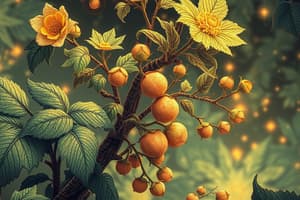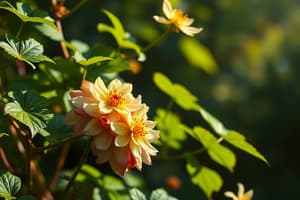Podcast
Questions and Answers
What is unique about the regenerative capability of plant cells?
What is unique about the regenerative capability of plant cells?
- Regeneration is limited to root cells.
- Any single plant cell can regenerate an entire plant. (correct)
- Plants can only regenerate through seeds.
- Only designated meristem cells can regenerate.
Which group of plants is known as amphibians due to their dependence on water for reproduction?
Which group of plants is known as amphibians due to their dependence on water for reproduction?
- Angiosperms
- Gymnosperms
- Bryophytes (correct)
- Pteridophytes
What is the main characteristic of tracheophytes?
What is the main characteristic of tracheophytes?
- They lack any form of vascular tissue.
- They are primarily aquatic plants.
- They have vascular tissues for conducting water and food. (correct)
- They reproduce exclusively through spores.
What distinguishes algae from other plant groups?
What distinguishes algae from other plant groups?
Why are algae considered an important resource in biotechnology?
Why are algae considered an important resource in biotechnology?
Which of the following best describes the life cycle of bryophytes?
Which of the following best describes the life cycle of bryophytes?
What role do nitrogen-fixing algae play in agriculture?
What role do nitrogen-fixing algae play in agriculture?
Which plant group is primarily characterized by their vascular structure and includes both seed and spore-bearing plants?
Which plant group is primarily characterized by their vascular structure and includes both seed and spore-bearing plants?
Flashcards
Kingdom Plantae
Kingdom Plantae
Autotrophic organisms in the plant kingdom convert light energy into chemical energy for growth.
Meristems
Meristems
Regions of actively dividing cells that enable plant growth at their tips.
Plant Regeneration
Plant Regeneration
A plant's capacity to regenerate a complete individual from a single cell.
Cellulose Cell Wall
Cellulose Cell Wall
Signup and view all the flashcards
Algae (Thallophytes)
Algae (Thallophytes)
Signup and view all the flashcards
Bryophytes
Bryophytes
Signup and view all the flashcards
Tracheophytes
Tracheophytes
Signup and view all the flashcards
Study Notes
Overview of Kingdom Plantae
- Kingdom Plantae comprises autotrophic organisms that convert light energy into chemical energy.
- Plants anchor to the ground to maximize sunlight capture, using water and carbohydrates for growth.
- Immobility allows plants to respond to environmental cues and synchronize their life cycles with seasonal changes.
Unique Plant Development
- Growth occurs through meristems located at plant tips.
- Remarkable regenerative capability allows a single plant cell to regenerate into a complete plant.
- Plant cells possess a cellulose cell wall, providing structure and support.
Classification of Plant Kingdom
- The plant kingdom is classified into the following groups:
- Algae
- Bryophytes
- Pteridophytes
- Gymnosperms
- Angiosperms
- Thallophytes (Algae)
Algae (Thallophytes)
- Algae are simple, aquatic plants with thread-like or flat bodies lacking roots or stems.
- They can live in both water and damp terrestrial environments.
- Exhibit a distinct alternation of generations, with the sporophyte being dependent on the gametophyte.
Bryophytes
- Colonized terrestrial environments but require water to complete their life cycle.
- Depend on a thin film of water for the motility of male gametes, facilitating fertilization with non-motile female gametes.
- Regarded as amphibians due to their reliance on water.
Importance of Algae
- Display biological diversity and produce various metabolic products, significant in biotechnology.
- Serve as a vital food source for freshwater and marine organisms and contribute to oxygen supply.
- Used as biofertilizers, particularly nitrogen-fixing algae, enhancing soil fertility.
- Assist in controlling water pollution and purifying sewage.
Tracheophytes (Vascular Plants)
- Tracheophytes include Pteridophytes, Gymnosperms, and Angiosperms, known for their vascular tissues that conduct water and nutrients.
- This group is the largest within the plant kingdom and encompasses both seed plants and non-flowering spore-bearing plants like ferns.
Studying That Suits You
Use AI to generate personalized quizzes and flashcards to suit your learning preferences.




